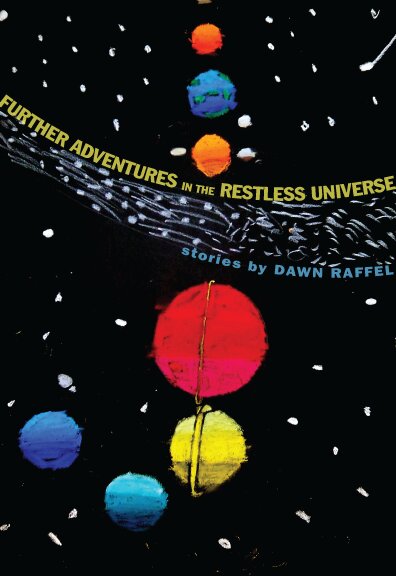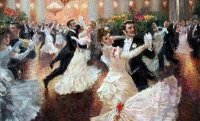Reviewed by Ben Stein November 15, 2009
Further Adventures in The Restless Universe, Dawn Raffel, DZANC Books
Yesterday, I received in my campus mailbox a desk copy of The Norton Introduction to Literature: Portable Edition (2006). It is standard anthology fare, including “Helpful and unobtrusive editorial matter” (this from a list of features that is included in the Preface for Instructors). Some of that editorial matter includes the following, taken from the “Understanding the text” section of the poetry unit, under the heading “Language”:
Fiction and drama depend upon language just as poetry does, but in a poem almost everything comes down to the particular meanings and implications of individual words. When we read stories and plays, we generally focus our attention on character and plot, and although words determine how we imagine those characters and how we respond to what happens to them, we are not as likely to pause over any one word as we may need to when reading a poem. Because poems are often short, a lot depends on every word in them. Sometimes, as though they were distilled prose, poems contain only the essential words. They say just barely enough to communicate in the most basic way, using elemental signs – with each chosen for exactly the right shade of meaning or feeling or both (465). [Emphasis mine.]
If “we” is being used according to critical convention to indicate a community of readers (and not simply in reference to Editors Alison Booth, J. Paul Hunter, and Kelly J. Mays) then some folks are being left out of this community. Namely, those who in fact are given to “paus[ing] over” single words, regardless of the genre of the text surrounding them. Were I concerned that any literature student might actually read this commentary, I would be worried that he or she might be misled to believe that there is no fiction that could be taken as “distilled prose,” nothing that does not contain a lot of “[in]essential words.” Were that student to ask me for an example of prose texts whose focal point might be something other than character and plot, I would suggest she look at Dawn Raffel’s first two books – the story collection In the Year of Long Division (Knopf, 1995) and the novel Carrying the Body (Scribner, 2004) – and her new collection, Further Adventures in the Restless Universe, scheduled for release by Dzanc Books in March 2010.
There is not much room for extraneous language here: just under 100 pages long, the collection contains twenty-one pieces, all of which have seen print in journals such as Fence, NOON, and Open City. Consider, for instance, the complex efficiency of the following, from “Mighty Breakers of the Sea”: “The girl in the white trips on a rock, which is sharp, which is hidden by the water, which has risen to her eyes. There is nobody there. She drowns.” In terms of essentialness-of-words, that last sentence leaves little room for debate. The argument over whether these lines are sufficiently distilled to qualify for the kind of close reading “we” usually reserve for poetry would presumably center on those prosaic pronouns in the second half of the first sentence. (Revised into the kind of poetry the Norton editors seem to be describing, that line might read like this: “The girl in white trips on / a rock: sharp, hidden by water / risen to her eyes.”) But it is the inclusion and repetition of “which” that gives the action a sense of inevitability. That is how pronouns work: they carry forward their antecedents, nudging the syntax – and the meaning it generates – inexorably forward. And in the second sentence, it is the words on the periphery – “there” and “there” again – that make the heart of the sentence – “nobody” – echo so dramatically. Considered in this light, the third sentence is not as coolly detached as it might initially read. Rather, because of the ostensibly inessential words within the previous two sentences, the content of the third sentence is a foregone conclusion, as demonstrated by and inherent in that simplest-possible, two-word construction: of course she drowns, nothing else need be said.
Elsewhere, in the most-compact of these stories, “Sibling,” Raffel uses a mere 100 words to move from the quiet joys of motherhood to the near-monstrous immediacy of an infant who needs. In this case, we can read the form of the story in the same way the Norton editors would have us read the form of a poem: its brevity, its structure (a kind of prose-haiku, with three lines of description, four lines of dialogue, and a volta that precipitates the closing three lines of action) gives a reader the sense that it is not a description but a depiction of motherhood. Raffel moves the focal character (a mother) from the position of observer (“there were two of them, boys, snug in their little knit caps”) through a verbal exchange, and into the midst of action. In that last part, though, the voice keeps the mother passive, even when the scene requires her to be an agent (we are told “The stroller reversed” – the narrative makes it clear that the mother is doing the reversing, but syntactically, there is nobody there). Reading “Sibling,” one is not told about the strange dangers of children, but rather allowed to sense them – and not (or at least not exclusively) through the conventional mechanisms of character and plot: it is the form that communicates the sudden turn, and the absent-agent construction that implies the on-autopilot functioning of a harried mother. Here and throughout the collection, what is usually considered the stuff of poetry gets harnessed to a narrative vehicle and the result is a genuinely- invigorating kind of linguistic motion.
Comparisons to poetry make sense when discussing Raffel – her sentences have a sonic complexity that enhances what semantic and syntactic meaning they generate. (Consider these lines: “She tapped on the drip. ‘Prop me,’ she said. ‘Lift me a little. Pummel and plump,’ she said. ‘Go ahead and hit.’” Listen to those vowels, their awkward bumps and jars, like an immobile person being indelicately handled.) And I’ve heard tell that Raffel’s live readings don’t actually involve reading; rather, she stands before a crowd, folds her hands, and recites from memory. I like this image: she’s monk-like, the story a prayer. I can’t say for sure whether it is true, but it fits. A Raffel story sings the way a poem does; when it gets spoken into being, it should feel like an incantation.
–
Ben Stein is a Contributing Reviewer for Emprise Review
For Further Reading:
Dawn Raffel’s website
The Woman in Charge of Sensation, also by Raffel
The Dzanc Books Page
Also reviewed by Ben Stein: The System of Vienna: From Heaven Street to Earth Mound Square









Pingback: cream.fm › Book Notes - Dawn Raffel (”Further Adventures in the Restless Universe”)
Pingback: Links!!! | Emprise Review